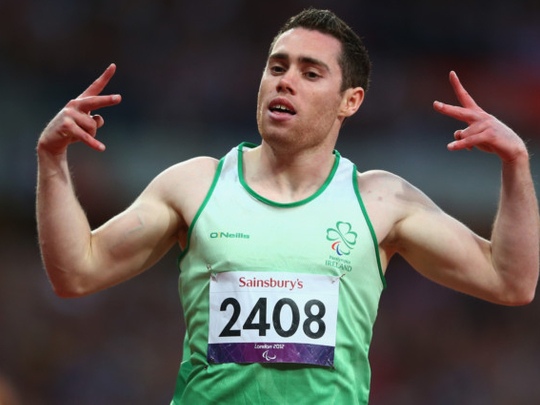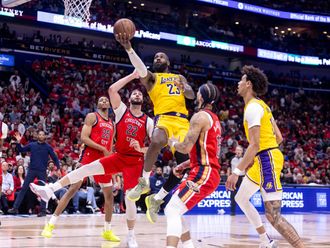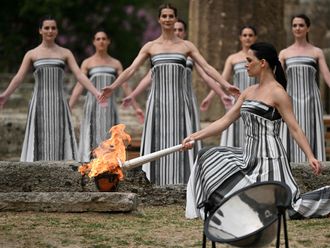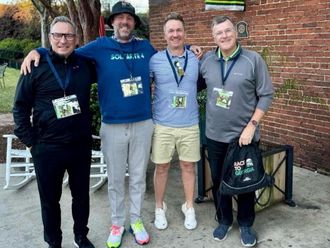
Abu Dhabi: Life passes by in a blur quite literally for four-time Paralympic champion sprinter Jason Smyth.
With only five per cent vision, which he compares to an unfocused camera, he views people as hazy outlines and therefore struggles to go anywhere alone.
Registered as legally blind, Smyth is also significantly hampered by the fact that he can only see the finish line of a race once he has crossed it.
Speaking to Gulf News, the 28-year-old said of his hereditary Stargardt’s disease, a degenerative loss of vision he developed at the age of eight: “It affects everything I do. The best way I can describe it is that I can see colours and blurry outline of shapes because of the colour contrast and from that I make out what shapes are.
“Imagine looking into a camera or taking a photo but it is not in focus. It is a bit like that, as you can’t see details of images but you can see blurry outline of shapes because of the colour.”
He added: “There are important things within training we have to adapt because my spatial awareness isn’t as good [as others]. Things like box jumping that make up part of plyometrics (jump training).
“When I compete, seeing the finish line is another challenge. I can’t see it until I cross it, which means my ability to dip and pick up those extra few hundredths of a second are lost, which in sprinting can make all the difference.”
Yet, while debilitated visually, Smyth has been blessed with blistering pace — he is the world-record holder across all disabled disciplines in the 100 metres with a time of 10.22sec — and an unyielding spirit.
It’s these qualities that have fuelled the fastest Paralympic sprinter on the planet’s desire to become the first visually-impaired athlete to compete at both the Paralympics and the Olympics.
In 2008, Smyth was bestowed with the ultimate accolade of ‘the Usain Bolt of the Paralympics’ at the Beijing Games after winning gold in both the T13 (the category for his disability) 100 and 200 metres.
Four years later in London, he repeated the feat — and that of Bolt — with his winning time of 10.46s in winning the 100 metres a Paralympic Games record.
Now the fiercely determined Northern Irishman is ‘leaving no stone unturned’ in his ambitious quest to line up alongside his hero at next year’s Rio Olympics.
Smyth, who took up running at the relatively late age of 16 on the advice of a school teacher after preferring football (he supports Liverpool) in his early years, said: “I have always set my targets high and I believe my goal is very achievable.
“In 2012, I ran within four hundredths of a second of the A standard, running 10.22s and needing to run 10.18s. I also ran the standard that same year with slightly too strong of a wind. That alone tells me it is possible because neither of those races were perfect.”
Smyth, who has already made history after becoming the first Paralympian to compete at an able-bodied European Championships in 2010 (he reached the semi-finals), added: “I think the big thing I need is consistency and to stay injury free over the next year and a half. I am doing everything I possibly can, leaving no stone unturned to give myself every possibility to achieve my Olympic dream.”
On winning double gold at the 2012 Paralympics — “my proudest achievement” — Smyth performed Bolt’s signature lightning bolt celebration “as a bit of fun”.
“It isn’t something I usually do,” he said. “It is a pleasure to be compared to him. He is an incredible athlete who has achieved great things. So for me to be likened to someone who has done those things is an honour.
“There is obviously a lot that I can learn from him, he is the best. What I like is that he enjoys what he does, he is an entertainer but at the same time he is always able to focus and perform at such a high level.”
Has he met the great man?
“I haven’t actually met him in person,” Smyth said. “I have been competing at competitions he has been at but not got the chance to meet him as of yet. It would be great to line up in the same race as him, just to say I have raced against him.
“Obviously my target is to line up at the Olympic Games, so if that was to happen then I wouldn’t care who I lined up against. But if you want to put the icing on the cake, it would definitely be to line up beside the man himself.”
However, his condition means he would struggle to recognise his idol.
Smyth said: “He could walk right beside me on the street and I wouldn’t know it was him. The details would be too blurry to tell who it was.
“How I would know who it was would be if he spoke. That is often the way I know people — hearing and learning their voice. As you can imagine, it takes quite a few times of meeting someone to learn their voice.
“People generally have to make the first step and engage with me for me to know who it is, otherwise it is just another blurry outline, which could be anybody.”
While he has yet to enjoy a dream confrontation with Bolt, Smyth revelled in the once-in-a-lifetime experience of training with the joint second-fastest man of all time, Tyson Gay.
Between 2009 and 2013, Smyth travelled to Florida to take part in sessions with the 2007 world 100-metre champion and other elite sprinters.
Gay has since hailed Smyth as being one of the top-five best technical sprinters he has met, along with luminaries such as Maurice Greene and Asafa Powell.
Returning the compliment in kind, Smyth said: “It was an incredible experience to train with him and some of the world’s fastest sprinters. I was able to learn so much.
“Technically I started to learn the art of sprinting, get first-hand experience from athletes who were some of the best at way they do. Every single day I had to be at my best to just keep up with these guys. I had to work hard and keep focused because, if I didn’t, I would find myself quite far behind quite quickly. I couldn’t have been in a better environment as an elite athlete to grow and improve.”
Given his admiration for Gay, Smyth did not wish to comment on the American’s year-long doping ban in 2013.
What does he think about another controversial sprinter, Oscar Pistorius, the prosthetic-limbed phenomenon who became a totemic figure for Paralympians as ‘Blade Runner’, before being jailed for killing his partner in 2013?
Smyth, who never raced against the South African as his disability has a different Paralympic classification to Pistorius’s, said: “I personally didn’t look at him as my role model, although I know and appreciate everything he has done for Paralympic sport.
“He really did play a big role in boosting the sport’s profile, which gave it a great foundation to now build on.”
Did he resent the fact that Pistorius dominated the limelight, while he and other Paralympians were achieving comparable brilliance?
“No,” he replied. “The sport needed headlines, it needed to become recognised by people throughout the world. If it was me, him or someone else it was irrelevant. I wanted to see the sport move forward, other than that I focused on me and what I wanted to achieve.”
Smyth, who will defend his 2013 International Paralympic Committee (IPC) World Athletics Championships 100 and 200 metres titles at the 2015 event in Doha, Qatar, in September, hopes his accomplishments and indomitability can create a powerful legacy.
Of his ability to inspire others, he said: “I think what I can bring to other people is belief. I feel I have big physical limitations to overcome.
“The more I can overcome them and push the boundaries of what people believe is possible, then the more I hope they can see that anything is possible in their own lives. That is something that I have learned in my life, is that we limit what we can achieve.
“If we believe anything is possible and work hard towards it, then anything is truly possible. Belief can do incredible things.”












